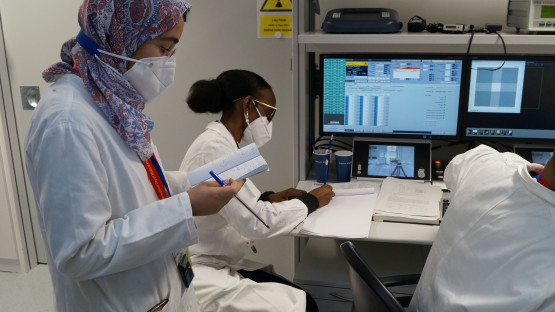The IAEA is launching a new Coordinated Research Project aimed at enhancing the academic development of radiation metrology specialists in low- and middle-income countries (LMICs). Beginning in 2025, this four-year long “Doctoral Coordinated Research Project in Radiation Metrology” will foster the development of new methodologies within the field. It will also increase the number of specialists able to train the next generation of radiation metrologists, while promoting long-lasting collaborations.
As the global cancer burden increases, hospitals around the world are using ionizing radiation more frequently to diagnose and treat patients. Meanwhile, advancements in technology and the introduction of novel techniques are changing how radiation is being utilized in medicine.
Radiation metrology, the science of measuring and quantifying ionizing radiation, is essential for assuring high-quality, safe and effective care, especially since deviations in intended ionizing radiation doses can result in adverse clinical effects. These range from inadequate diagnostic procedures to ineffective interventions to irreparable injuries.
Against this backdrop, the IAEA is strengthening the expertise and capabilities of LMICs by supporting innovative research on areas directly relevant to radiation metrology. Research topics could include, but are not limited to, dosimetry for radiopharmaceutical therapies, advanced dosimetry for diagnostic radiology; and advanced dosimetry in radiotherapy and brachytherapy.
Each research team under the Coordinated Research Project (CRP) will consist of one PhD student from a LMIC and two academic supervisors – one from the university awarding the degree and another, a remote co-supervisor, who is a specialist on the proposed topic from a country with relevant expertise. As the contract holder of the CRP, the local supervisor serves as the principal scientific investigator and bears the main responsibility for guiding the student throughout their studies. The remote mentor will provide guidance to ensure the overall quality and scientific relevance of the research. Together, all three will conduct studies on themes related to advanced dosimetry and radiation metrology.
CRP Overall Objective:
The primary objective is to enhance the academic development of specialist radiation metrologists within Secondary Standards Dosimetry Laboratories (SSDLs) in LMICs. This will be achieved by facilitating advanced dosimetry research and establishing international scientific networks. More broadly, the CRP aims to improve the quality and accuracy of dosimetry services in participating countries by developing new radiation dosimetry methodologies.
Expected Outcomes:
- Radiation metrologists who have the knowledge and capacity to improve dosimetry traceability at the national level; to coordinate, support or initiate education and training programmes at their institutions or others at the national or regional level, and to contribute to the training of future radiation metrologists and medical physicists.
- Increased implementation of dosimetry traceability at the local level.
- Publications that lead to improved radiation dosimetry practices, benefiting all countries.
- The formation of scientific networks that participants can rely onto further advance the field.






